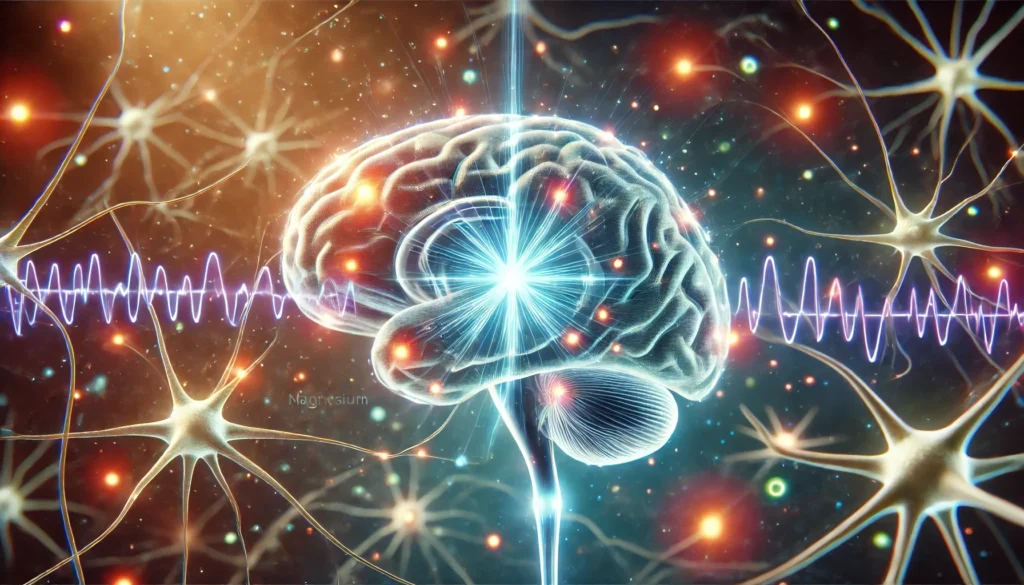In the quest for optimal mental performance, magnesium often stands in the shadows of more high-profile nutrients. However, this essential mineral plays a surprisingly significant role in brain health and cognitive function. This article delves into the fascinating world of magnesium and its potential to enhance focus, weaving together scientific insights, historical context, and practical advice.
You May Also Like: Top Brain Health Product Brands Reviewed
The Underappreciated Mineral: Magnesium
Magnesium is a vital mineral involved in over 300 biochemical reactions in the body. It is crucial for maintaining normal nerve and muscle function, supporting a healthy immune system, and keeping the heartbeat steady. Despite its importance, many people do not get enough magnesium in their diets.
Historical Context of Magnesium Use
Magnesium’s therapeutic use dates back centuries, with various cultures recognizing its calming properties. Ancient Egyptians are believed to have utilized magnesium sulfate, commonly known as Epsom salts, for its soothing effects. This mineral was often used in baths to relieve muscle tension and promote relaxation, a practice that remains popular today.
In ancient Greece, physicians prescribed magnesium-rich mineral waters to treat various ailments, including digestive issues and muscle cramps. Such practices underscore the long-standing recognition of magnesium’s medicinal properties. The historical use of magnesium sets the stage for its modern applications, particularly in mental health and stress management.
Evolution of Magnesium Research
While historical uses laid the groundwork, scientific research into magnesium’s role in health began in earnest in the 20th century. Early studies focused on its physiological functions, such as its role in energy production and bone health. As research advanced, scientists discovered magnesium’s impact on the nervous system, highlighting its potential in neuroprotection and cognitive enhancement.
In recent decades, the exploration of magnesium’s neurological benefits has expanded significantly. Researchers are delving into its effects on neurotransmitter regulation, synaptic plasticity, and overall brain function. This growing body of research continues to unveil new insights into how magnesium can enhance cognitive performance and mental clarity.
Current Trends in Magnesium Supplementation
The popularity of magnesium supplements has surged as people seek natural ways to enhance cognitive function and manage stress. From athletes to busy professionals, individuals are turning to magnesium to support brain health and improve focus. This trend is driven by a desire for holistic wellness solutions and a growing awareness of the mineral’s benefits.
Market trends indicate a diverse range of magnesium supplements, catering to different preferences and needs. From capsules to powders and even topical applications, the options are vast. However, it’s crucial to navigate these choices wisely, understanding the specific benefits and bioavailability of different magnesium forms to maximize their efficacy in cognitive enhancement.

Is Magnesium Good for the Brain?
Magnesium’s reputation as a brain-boosting mineral is supported by a growing body of scientific research. Let’s explore how magnesium benefits the brain and why it might be your new go-to for mental clarity.
Magnesium and Neurotransmitter Regulation
Neurotransmitters are the brain’s messengers, responsible for transmitting signals between nerve cells. Magnesium plays a critical role in regulating neurotransmitters, ensuring that they function efficiently. This regulation is key to maintaining focus and attention.
Studies have shown that magnesium deficiency can lead to reduced levels of serotonin, a neurotransmitter that helps regulate mood and cognition. By ensuring adequate magnesium intake, one can support a balanced neurotransmitter environment, promoting better focus and concentration. Additionally, magnesium’s influence extends to other neurotransmitters like dopamine and GABA, further underscoring its importance in cognitive processes.
Magnesium’s Impact on Synaptic Plasticity
Synaptic plasticity refers to the brain’s ability to adapt and change in response to new information. It’s a fundamental process underlying learning and memory. Magnesium is essential for synaptic plasticity, as it influences the activity of NMDA receptors, which are critical for synaptic transmission and plasticity.
Research indicates that higher magnesium levels correlate with improved synaptic function, suggesting that magnesium supplementation could enhance learning and memory—key components of sustained focus. Furthermore, experimental studies in animal models have demonstrated that magnesium can facilitate the formation of new synaptic connections, potentially enhancing cognitive resilience and adaptability.
The Role of Magnesium in Neuroprotection
Beyond neurotransmitter regulation and synaptic plasticity, magnesium’s neuroprotective properties are garnering attention. It helps mitigate oxidative stress and inflammation, both of which can impair brain function. Magnesium’s antioxidant properties protect neural cells from damage, preserving cognitive health over time.
In conditions of magnesium deficiency, the brain becomes more susceptible to neurodegenerative processes. By maintaining adequate magnesium levels, individuals can potentially reduce the risk of cognitive decline and support long-term brain health. This protective role highlights magnesium’s broader implications in preserving cognitive function and enhancing mental clarity.
Does Magnesium Help Focus?
The connection between magnesium and focus is an area of active research. While more studies are needed to draw definitive conclusions, existing evidence points to magnesium’s potential in enhancing cognitive performance.
Magnesium for Stress Reduction
Stress is a major impediment to concentration. When stressed, the body releases cortisol, a hormone that can impair cognitive function. Magnesium helps regulate the body’s stress response, potentially reducing cortisol levels and mitigating its negative impact on focus.
Chronic stress can lead to a cycle of poor concentration and mental fatigue, making magnesium’s role in stress reduction particularly valuable. By supporting the adrenal system and promoting relaxation, magnesium can help break this cycle, enabling individuals to maintain sharper focus and greater mental endurance. This stress-relieving effect is one reason why magnesium is often recommended for those facing high-pressure situations.
Improving Sleep Quality with Magnesium
Quality sleep is essential for optimal brain function. Magnesium plays a role in promoting restful sleep by regulating melatonin, the hormone that controls sleep-wake cycles. Improved sleep quality translates to better focus and mental clarity during waking hours.
In addition to melatonin regulation, magnesium’s muscle-relaxing properties contribute to better sleep by alleviating physical tension. This dual action makes it a powerful ally in achieving restorative sleep, which is crucial for cognitive performance. Individuals who prioritize magnesium intake often report waking up more refreshed and experiencing enhanced mental acuity throughout the day.
Real-World Evidence and Anecdotes
While scientific studies provide valuable insights, real-world evidence and personal anecdotes also highlight magnesium’s benefits for focus. Many individuals report enhanced concentration and reduced mental fatigue after incorporating magnesium into their daily routines.
These anecdotal accounts often emphasize the cumulative effects of magnesium on cognitive health. Regular users note improvements in their ability to handle complex tasks, sustain attention, and manage stress. Such firsthand experiences, combined with scientific findings, reinforce magnesium’s potential as a natural cognitive enhancer, offering practical insights into its integration into daily life.

Magnesium for Brain Health: Practical Advice
For those looking to optimize their mental performance, incorporating magnesium into one’s diet or supplement regimen could be a wise choice. Here are some practical tips:
Dietary Sources of Magnesium
Incorporating magnesium-rich foods into your diet is a natural way to boost your intake. Some excellent sources include:
- Leafy greens such as spinach and kale
- Nuts and seeds like almonds and pumpkin seeds
- Whole grains such as brown rice and quinoa
- Legumes like black beans and lentils
Beyond these staples, consider adding avocados, bananas, and dark chocolate to your diet, as they also provide substantial magnesium. By diversifying your food choices, you can ensure a steady supply of this essential mineral, supporting overall health and cognitive function. Emphasizing whole, unprocessed foods can further enhance nutrient absorption, maximizing the benefits of dietary magnesium.
Choosing the Right Magnesium Supplement
If dietary intake is insufficient, magnesium supplements can be an effective alternative. However, not all supplements are created equal. Magnesium citrate and magnesium glycinate are often recommended for their high bioavailability and minimal side effects.
When selecting a supplement, it’s important to consider your specific health needs and any existing conditions. Some forms of magnesium, like magnesium oxide, are less easily absorbed and may cause gastrointestinal discomfort. Consulting with a healthcare professional can help you identify the best supplement type and dosage, ensuring safe and effective support for cognitive health.
Dosage and Safety Considerations
Before starting any supplement regimen, it’s important to consult with a healthcare professional, especially if you have underlying health conditions or are taking other medications. The recommended dietary allowance (RDA) for magnesium varies by age and sex, but adult men typically require 400-420 mg per day, while adult women need 310-320 mg per day.
In addition to these guidelines, it’s crucial to be aware of potential interactions with other medications and the symptoms of magnesium overdose, which can include nausea, diarrhea, and abdominal cramping. Monitoring your magnesium intake and adjusting it based on your body’s response can help optimize its benefits while minimizing risks. Regular check-ins with a healthcare provider can provide additional guidance and support.
Future Implications and Research Directions
As interest in brain health and cognitive enhancement grows, magnesium is likely to remain a focal point of research. Future studies may further elucidate its role in neuroprotection, mental health disorders, and overall cognitive performance.
Expanding Research on Magnesium’s Cognitive Benefits
Emerging research is exploring magnesium’s potential in addressing cognitive decline associated with aging. Scientists are investigating its impact on neurodegenerative diseases like Alzheimer’s and Parkinson’s, aiming to uncover preventive strategies and therapeutic interventions. These studies could reshape our understanding of magnesium’s role in long-term brain health.
Magnesium’s Role in Mental Health Disorders
There’s growing interest in magnesium’s application in mental health treatment, particularly for conditions like depression and anxiety. Researchers are examining its effects on mood regulation and emotional resilience, seeking to develop complementary therapies that leverage magnesium’s calming properties. Future findings could pave the way for novel, integrative mental health approaches.
Technological Advances in Magnesium Research
Advancements in neuroimaging and biomarker analysis are enhancing our ability to study magnesium’s effects on the brain. These tools provide deeper insights into how magnesium influences neural pathways and cognitive processes. As technology evolves, it promises to unlock new dimensions of understanding, propelling magnesium research into uncharted territories of cognitive science.

Conclusion: Embracing Magnesium for Mental Clarity
Incorporating magnesium into your health regimen could be a game-changer for enhancing focus and brain health. While more research is needed to fully understand its potential, the current evidence is promising. By prioritizing magnesium intake through diet or supplementation, you can support your brain’s ability to function at its best.
In the ever-evolving landscape of health and wellness, magnesium stands out as a reliable ally in the pursuit of mental clarity and cognitive excellence. Whether you’re a health coach, journalist, or biohacker, understanding and leveraging magnesium’s benefits can empower you and your audience to achieve greater focus and cognitive well-being. As we continue to explore its myriad benefits, magnesium offers a natural, accessible path to enhanced mental performance and overall vitality.
Further Reading:
What to know about magnesium for ADHD
Magnesium for Anxiety: Does It Help?
Magnesium and the Brain: A Focus on Neuroinflammation and Neurodegeneration
Important Note: The information contained in this article is for general informational purposes only, and should not be construed as health or medical advice, nor is it intended to diagnose, prevent, treat, or cure any disease or health condition. Before embarking on any diet, fitness regimen, or program of nutritional supplementation, it is advisable to consult your healthcare professional in order to determine its safety and probable efficacy in terms of your individual state of health.
Regarding Nutritional Supplements Or Other Non-Prescription Health Products: If any nutritional supplements or other non-prescription health products are mentioned in the foregoing article, any claims or statements made about them have not been evaluated by the U.S. Food and Drug Administration, and such nutritional supplements or other health products are not intended to diagnose, treat, cure, or prevent any disease.


